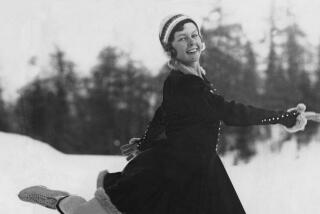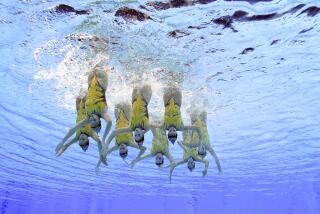WINTER OLYMPICS : KATARINA WITT : In a Wink, She Wins Them Over as Henie Did
- Share via
CALGARY, Canada — If East German sports officials wanted to dispel the outdated stereotype of their female athletes as broad-shouldered, sullen automatons, they could not have conceived of someone to better serve as an example than Katarina Witt.
Assuming that the first priority is that she has to be as accomplished in her sport, figure skating, as her sister swimmers, sprinters, speed skaters and rowers are in theirs, Witt, 22, easily meets that standard.
She may now be the standard, having won an Olympic gold medal four years ago in Sarajevo, three world championships--1984, ’85 and ‘87--and six consecutive European championships.
Her latest victory in the European championships, last month in Prague, Czechoslovakia, enabled her to equal the record of Norway’s Sonja Henie, who won all of them from 1931 through 1936. If, as expected, Witt wins another gold medal in Calgary, she will be the first woman individual to repeat as Olympic champion since Henie, who won in 1928, 1932 and 1936.
But it is not only Witt’s considerable talent that attracts attention. There is also her charisma. That word has been used more often in recent years in connection with East German athletes, most notably track and field’s Heike Drechsler, but Witt was the first to display it in abundance.
During a practice before last year’s World Championships in Cincinnati, Witt (pronounced Vit) responded to applause by waving and smiling. They seemed normal, polite gestures. But Alex McGowan, who coaches the United States’ Debi Thomas, accused Witt of “milking the crowd” in a “planned, not spontaneous” effort to win its loyalties away from Thomas. He pleaded with the crowd through the local press not to “fall for this.”
It was too late. The crowd was smitten. After receiving even more enthusiastic applause at the next day’s practice, Witt went among the crowd and signed autographs.
“We try to make nice relationships,” said Witt’s coach, Jutta Mueller, who for some reason felt obliged to respond to McGowan’s charges. “Katarina does not need to draw the public to her side by any other means. She does it with her skating. And part of it is, when your public claps, you thank them by bowing to them.”
By the end of the week, everyone, including McGowan, had to bow to Witt.
It had been the first time since 1984 that she had not been the defending champion, having lost her title the year before in Geneva, to Thomas. It seemed as if Thomas might win again when she skated her long program brilliantly. But if that put pressure on Witt, who skated immediately after Thomas, it was not apparent in her performance. She has never been better, drawing raves not only for her artistry but also for her ability to compete.
On tour in Los Angeles a short time later, Witt said she found it unusual when people praised her for her competitiveness because she does not believe that is one of her attributes.
“Competitions make me nervous,” she said, speaking English that she learned in school and honed during international competitions and tours. “When I go out on the ice, I just think about my skating and not, ‘I have to do this to win.’ I forget it is a competition. There are many people watching on television and many spectators. I skate for them. You can feel whether they like it.”
They almost always do, but you have to wonder how many of them are responding to something other than her triple salchows. There is no need to point fingers. You men know who you are.
Network television officials say figure skating ratings increase when Witt is among the performers.
After the 1984 Winter Olympics, she filled her bathtub with 35,000 fan letters, not a few of them marriage proposals. A U.S. cosmetics firm offered her a modeling contract, but it was rejected by the East German sports federation.
Sportswriters have waxed rhapsodic. She has been described in various accounts as doe-eyed, ruby-lipped, fresh-faced, buxom, enchanting, ethereal and 12-car pileup gorgeous. She most often is compared with Brooke Shields.
Some athletes might feel offended by the continual references to their appearance, feeling that their talent is being overlooked. Not Witt.
“I like it,” she said. “Yeah, I like it very much. Which young woman doesn’t like it?”
In a less subjective sport, none of this would make a difference. But in figure skating, the package influences judges. Witt knows how to use hers. Mueller taught her to choose one male spectator and maintain eye contact with him throughout her routine as if they are the only two people in the arena and her performance is for him only. In a word, she is a flirt.
Witt started skating when she was 5, having persuaded her parents to let her take advantage of the rink that was only five minutes from her kindergarten.
“I started the class late,” she said. “The teacher said I would have to learn as much in half a year that the others learned in a year. I did it.”
Her mother, a physical therapist, and her father, a department director at a plant and seed co-op, preferred that she develop an interest in dancing, but she got no further than the polka.
“I was embarrassed to do that,” she said.
She was discovered at age 10 by Mueller, the best-known coach in East Germany. Mueller, 59, has seen her pupils win 49 international medals, including 24 golds. She coached Anett Potzsch to a gold medal at the 1980 Winter Olympics in Lake Placid. Keeping it in the family, Potzsch is married to Witt’s brother.
“When Frau Mueller took me, I was too young to realize the great thing that had happened to me,” Witt said. “If Frau Mueller takes a girl or a boy, it’s because she sees them as a champion sometime. I understood that much later.”
Witt’s plan was to retire two years after the Sarajevo Olympics, but she changed her mind after losing to Thomas at the 1986 World Championships. Her explanation is that she still enjoyed skating. The unofficial explanation is that Mueller did not yet have another champion to replace her.
Witt was still allowed to enroll in acting classes in 1986. She said her screen favorites are Alain Delon, a French leading man; Romy Schneider, an Austrian leading lady; and Kirk Douglas.
Mueller says there are no movie stars in East German society, but Witt is already treated like one. She has her own apartment, drives a Soviet-made Lada sports car, wears a gold and diamond ring and covers herself with high-fashion suede and fox fur jackets.
“My friends maybe were jealous at first, but now they see what I have to do,” Witt said. “They said, ‘Oh, you get to travel around the world and buy things, and everybody knows you.’ But then they realized that it is hard work. I can’t even go out with them most of the time. They go out three or four times a week.
“When I was younger, I wanted to go out more. But I know now that I am doing things for myself that not many can do. In 30 years, I can say that I was world champion. My friends can say they went out to discos.”
At the World Championships last year in Cincinnati, she told reporters that she had a boyfriend. “You missed your chance,” she said, giggling. “Now it’s over.”
But she denied a rumor that she is engaged.
“No, no, no, no, no,” she said. “A skater should be there for everybody.”
More to Read
Go beyond the scoreboard
Get the latest on L.A.'s teams in the daily Sports Report newsletter.
You may occasionally receive promotional content from the Los Angeles Times.






